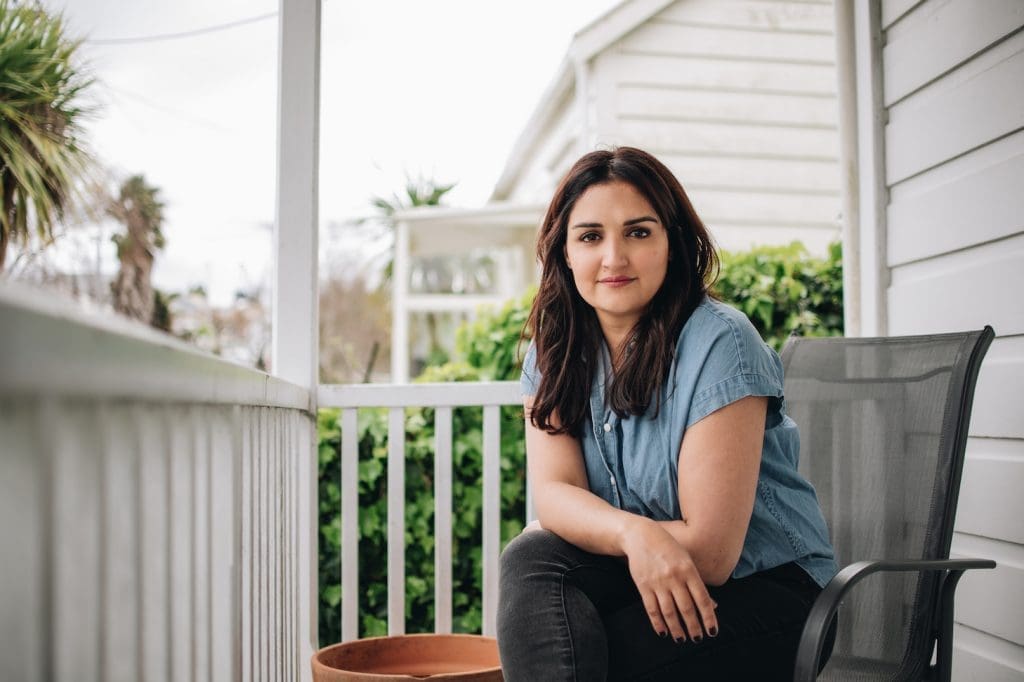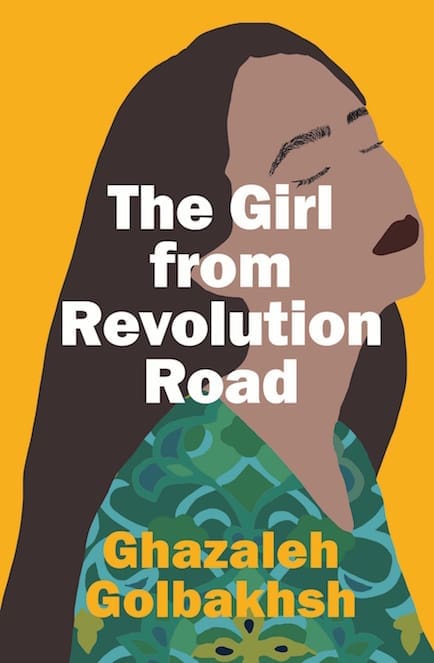A writer, filmmaker, actor and academic, Ghazaleh Golbakhsh has written an essay collection The Girl From Revolution Road, which takes the reader from her Iranian childhood, through to growing up in Auckland, right on into dating during Covid-19. Ghazaleh talks to Capsule about the creative process, the burden of representation and why she worries that criticisms of her cultural identity will often be her ‘default’ experience.
It takes a delicate balancing act to write a book of personal essays that includes the culture shock of immigration, the frustration of misrepresentation and the absurd reality of dating on Tinder during a pandemic, but Ghazaleh Golbakhsh has managed to do all that and more in her book The Girl from Revolution Road. A writer, filmmaker, actor and academic, Ghazaleh’s first book is, as she calls it, “a mishmash of things,” discussing the numerous events that have shaped her life. It’s clever and funny and poignant and sad and sarcastic and I gobbled it down in two sittings. The themes of home and belonging run through the book – having a foot in two very different cultures.
“For me, the idea of home has become where your memories are, where your family is. My parents and my sister and most of my mum’s side of the family live in New Zealand, and my dad’s side live in North America. So, it’s about memories – and now that I’m in my late 30s, most of my childhood memories are here,” Ghazaleh says. “So, when I go back to the North Shore, I might get this giddy, familiar feeling – even though it’s just The Shore,” she laughs.
She went back to Tehran in the 1990s and would like to go again, but like everything with Iran, it’s complicated. “I would love to go for a month or two but under this regime, it would be quite difficult. Everyone’s worried when they go back – as an Iranian, you’re under those jurisdictions. If you see an Iranian with two passports and God forbid, you get arrested, the foreign government has no jurisdiction over there and you’re kind of screwed. So that’s the fear.”
For many people who have gone through the immigration process, the idea of home is a complex one. It’s even more complex when actually being able to get home is difficult – something that a lot of people will be dealing with this year, when leaving New Zealand isn’t really possible. Iran is a beautiful country full of amazing culture, wonderful people and a history that spans thousands of years. It’s also run by a regime that is very cruel once crossed. The defining moment that led to Ghazaleh’s parents deciding to leave the country with their family starts off as a simple family party. It’s just that in Iran, alcohol is banned, as are mixed gatherings between men and women, and so is dancing (banned for women only). So, not a simple party after all. The homemade vodka is pouring and a young Ghazaleh is besotted with the sight of a women wearing all denim, dancing on the makeshift dance floor. The party is crashed by armed soldiers – Iran’s Religious Police – pointing AK47s at the family members.
The entire party is kept in prison overnight, with older members of both genders to be lashed as punishment. Ghazaleh writes vividly about her father’s punishment – lashed with a cable wire 60 times in the middle of a public square. Yes, it reads as very medieval, but this is Iran in the 1980s. It takes a month to even start to heal, she writes. This becomes the tipping point for the family to leave the country, ASAP. They move to one of the only places still willing to give visas to Iranians: New Zealand. “They speak English and have good lamb” is the selling pitch.

Now older than her parents were when they had to make the life-changing decision to shift countries and cultures, Ghazaleh says she has immense respect for how hard that move was. “I have huge appreciation for what they went through when they left and what they went through here… there are a lot of people who are anti-immigration or anti-refugee that don’t understand that for a lot of people, it’s not a choice. There are so many factors. And it’s not an easy thing – particularly if you don’t know the culture. It’s not like British people moving to New Zealand. I went to London but it’s very similar, culturally, and I was on my own with no kids. And I knew I could always come back to New Zealand. That’s the difference. My parents knew they were coming to New Zealand for good.”
Ghazaleh also writes about the double-edged sword of representation that can be found in the arts. There is an increasing push to get more diversity on the screens but the kind of roles offered in that diversity are often the same – there’s a type of representation that is acceptable. As a woman with Middle Eastern heritage, Ghazaleh writes in the book about being offered roles of either ‘the victim’ or ‘the domestic help.’ That’s why it’s so key, Ghazaleh says, to have representation behind the scenes as well – in the writing room, in the director’s chair.
“I think you can have positive stereotypes and it can work, particularly in comedy, but it only works if there are other variations of it. If that’s the only story – Middle Easterns are terrorists and bad – then that’s obviously going to be problematic.”
But there are positive changes coming, including in our beloved Shortland Street. “I’m playing a small role as a detective and it’s great because she’s Iranian and there have been heaps of scenes where it’s just me acting with only people of colour. When I auditioned, she had an Irish name and they said, ‘No, we’ll give you a name from your own ethnicity.’”
New Zealand is in a good place to be a positive example to the world, Ghazaleh says, because we have “the aptitude to change.” “We don’t have a gazillion people and we don’t have Donald Trump. I have seen a lot of good here. But I wouldn’t say New Zealand isn’t a racist country – it’s as racist as anywhere else, particularly somewhere that’s a former colony, you’re literally founded on racism. But I still feel safer here – even though March 15 was a wake-up call.”
“But there are times… I’ll give you an example. I had a certain person walk up to me yesterday while I was walking my flatmate’s dog and my assumption of him was that he was someone who might sneer at me, just because of how I looked,” she says. “But it was the complete opposite – he was all about the dog. So even in my own mind, I have to remind myself that not everyone is like that.”
She mentions the idea of her racial identity being her ‘default.’ “I have a friend of mine who’s an actress; she was always a bit bigger growing up and as an actor, you have a heightened awareness of that. She said ‘That’s my default,’ especially auditioning she expects to hear ‘fat’. Whereas for me, it’s ‘foreign.’ Like if someone’s going to yell at me, like if they take the parking spot or whatever, my first thought is always ‘are they going to be racist? Or are they just going to yell at me?’”


When it came to writing The Girl from Revolution Road, Ghazaleh says she thought the readership would be “people like myself, or my sister; people who grew up here but didn’t know much about their culture from back home… being in that place of ‘Am I in between, or am I enjoying being both?’” But she’s been surprised to see just how wide the audience has been. “This was never going be my Man-Booker-winning, in-depth look into the exile life – it’s just me looking at my experiences, which I always thought were really normal until I realised that they’re not. And then I realised it was great to put it out there, so that if someone else was going through it, they would realise there are a lot of other people who are as well.”
The Girl from Revolution Road by Ghazaleh Golbakhsh is out now from Allen & Unwin. Ghazaleh will be appearing at WORD Christchurch (29 Oct-1 Nov) and Verb Wellington (6-8 Nov).

